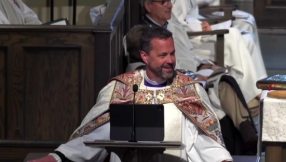
The Lausanne Movement is weighing in on how artificial intelligence might shape the future of Christian mission.
Under its new research division, LIGHT, the movement is examining both the opportunities, challenges and responsibilities presented by the rapid rise of AI in the Church and everyday life — from communication and learning, to ministry, theology and pastoral care.
“AI is neither savior nor threat in itself,” said the latest LIGHT briefing on AI. “Rather, its value depends on how it is discerned, governed, and deployed by God’s people.”
As AI becomes increasingly embedded in global society, the Lausanne initiative aims to guide church leaders in understanding how technology can support, rather than distort, the Church’s mission to fulfil the Great Commission.
For pastors, missionaries, and theologians, the conversation goes far beyond ethics.
Artificial intelligence is now translating Scripture, automating communication, and assisting in evangelism and outreach — a tool that can accelerate mission work, yet risk diminishing human connection if misused.
The LIGHT Briefing cautions against both “naïve optimism and paralyzing fear.”
Instead, it urges believers to engage AI with theological depth and ethical awareness, asking questions such as: “How can these tools strengthen authentic relationships rather than replace them? How might the church model transparency, equity, and justice in a digital age? And how can AI be leveraged to accelerate the Great Commission while keeping Christ at the center?”
To help ministries discern wisely, Lausanne researchers propose a four-part ethical framework.
It calls the Church to keep technology aligned with the Great Commission (Commission Alignment); to strengthen rather than replace genuine human and divine relationships (Relational Alignment); to ensure fairness, sustainability, and care for the vulnerable (Utility and Equity Alignment); and to uphold transparency, accountability, and moral responsibility in all technological use (Moral Alignment).
These principles encourage the Church to ensure that all technological use reflects biblical values of justice, truth, mercy, and love.
The report warns: “AI must not be allowed to interfere with ... our communion with God nor our connection with others. Rather, it should be leveraged to strengthen authentic human connection.
“As beings morally accountable to God, we can never assign moral agency to machines. Ultimately, we must take responsibility for the technologies we use and share with others.”
One of the most discussed applications is proclamation evangelism — the public sharing of the Gospel.
While AI can now translate Scripture into new languages or generate culturally relevant content, Lausanne emphasises that digital tools cannot replace the incarnational witness of believers.
“The gospel remains unchanged,” the authors write. “Biblical commands transcend technological innovation and demand faithful proclamation, regardless of medium.”
AI may assist evangelists in streamlining communication, protecting workers in restricted regions, and analysing data to reach new audiences, but the embodied human voice, they argue, remains irreplaceable.
The report states: “Jesus, the Word made flesh, proclaimed the kingdom through his incarnational presence. Embodied humans — ensouled, indwelled, and empowered by his Holy Spirit — connect with other humans in ways a machine never can and never will. Evangelism involves testimony of ‘lived experience’ with Jesus.
“In an increasingly artificial and disembodied world, it is the authentic and embodied human that brings the tangible love of Christ to the lost and lonely. Our presence says we cared enough to show up in person to ‘proclaim the good news to the poor’ and ‘proclaim liberty to the captives.’”
The LIGHT Briefing acknowledges that the church has faced technological revolutions before and will do so again. With discernment, courage, and prayer, believers can approach this new frontier not with fear, but with hope — trusting that in the digital age, as with ages before, God’s mission continues through His people.
The report concludes: “Relationally, AI challenges the efficacy of God’s design. Theologically, AI challenges the sufficiency of God’s methods. These challenges must be confronted and considered prayerfully.
“While AI may augment, it must always serve, not supplant, the spirit-filled human herald in proclaiming the good news and fulfilling the Great Commission.”













